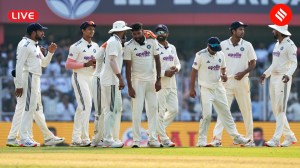SC Constitution bench reasons: Even as the five-judge Constitution bench of the Supreme Court on Thursday clarified that governors and President are not “bound by judicially prescribed timelines in the discharge of functions”, it first elaborated on the reasons why it should answer the Presidential reference made to it on the crucial issue.

The central point of argument was that the powers of President in referring questions under Article 143 (power of President to consult Supreme Court) are contingent on the fact that a ‘question of law or fact has arisen, or is likely to arise’, which those opposing the reference said, was not the case here as the issues were answered conclusively by the two-judge bench previously in the matter over the assent to bills in Tamil Nadu.
The counsel appearing for the parties opposing the reference stressed that the Presidential reference was an appeal, or review in disguise.
The Constitution bench, however, went ahead to answer the questions by giving the following key reasons:
1. Endowed with the institutional capacity and the constitutional duty to answer references that will ensure that the Constitution is nurtured and worked for the benefit of the people.
2. The exercise of this advisory function is a constitutional dialogue between the Executive and the Judiciary.
Story continues below this ad
3. An authoritative opinion mandated since the law on the functions of Governor and President under Article 200 and Article 201, cannot be left in a state of confusion, as it would impede smooth functioning of the Constitution.
4. There exists substantial satisfaction of President, that these are questions of law that have arisen, or are likely to arise, which are of public importance, which necessitate that an opinion be sought from this court.
5. It is an institutional responsibility, to tender its opinion on this functional reference sought by the highest constitutional functionary of the country.
6. The court cannot shirk away from its responsibility to iron out constitutional creases, to authoritatively clarify the roles of constitutional institutions, when doubts as to their roles and powers are raised.
Story continues below this ad
7. This court is empowered, and entrusted under Article 143, with the duty to answer such questions in service of the Constitution, and the people that have so adopted it.
8. Judicial propriety, and institutional integrity requires that this Court answer the questions referred to it in the present proceedings.
9. The allegation that the non-disclosure of the (two-judge bench) judgment in itself, reflects mala fides, is certainly a leap in logic, and one which does not behove this Court to entertain, against the highest constitutional functionary, i.e., President.
10. A challenge to the maintainability of the reference on the grounds of malafide is no longer available in view of the pronouncement of this Court in Natural Resources Allocation (written briefs and arguments advanced can be relied on to discern the legal controversies before this Court under Article 143 itself).
Story continues below this ad
While the Constitution bench said there was “no formulaic manner, or timeline” the courts could establish by a judicial order, it clarified the “constitutional office of Governor is definitely subject to the jurisdiction of the court, to prevent prolonged and evasive constitutional inaction”.
President Murmu on May 13 invoked the Supreme Court’s advisory jurisdiction on the time limit to assent to bills. This was done under Article 143(1) of the Constitution, wherein President may refer a “question of law or fact” to the Supreme Court for its opinion. The opinion, unlike a ruling, is not binding.
SC’s April 8 ruling fixed a three-month deadline for President to clear Bills reserved for her consideration by Governor.
That ruling, by a two-judge Bench headed by Justice J B Pardiwala, set aside Tamil Nadu Governor R N Ravi’s decision to withhold assent to 10 pending Bills.

































